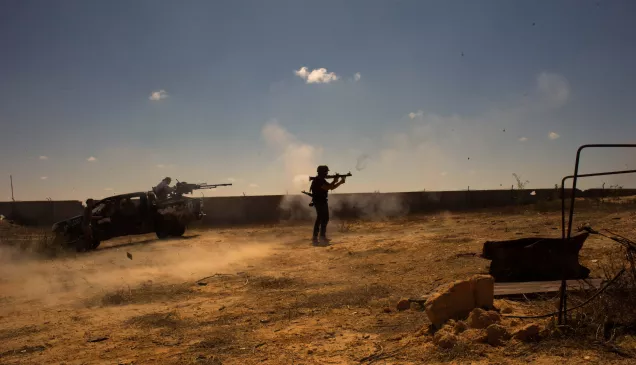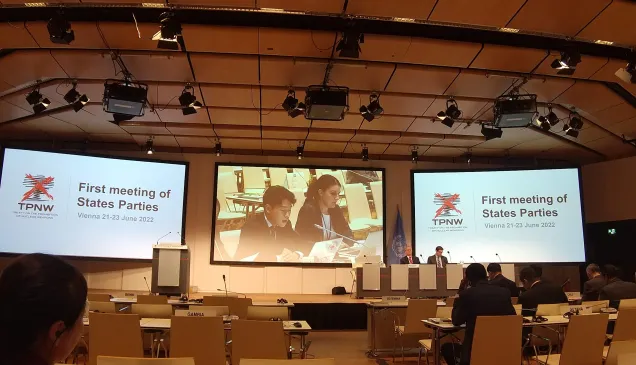Chemical weapons use: An unacceptable repeat of history that demands attention
Nineteenth Session of the Conference of the States Parties to the Chemical Weapons Convention, 1 – 5 December 2014, The Hague, Netherlands. Statement by the ICRC.
The centenary of the first use of poison gas during the First World War, which will be marked in April of next year, is an opportunity to reflect both on the impressive achievements already recorded on the way to ridding the world of chemical weapons, and on the significant challenges that remain.
During the First World War, the International Committee of the Red Cross (the ICRC) bore witness to the horrific injuries inflicted on soldiers by the use of poison gas. In February 1918, we appealed to States and to the public to "ban this appalling method of waging war." By then, the severity and scale of the suffering had shocked the public conscience and hardened the resolve of States to agree a new treaty prohibiting the use of chemical weapons, the 1925 Geneva Protocol, which applied to inter-State conflicts. In 1993, the Chemical Weapons Convention strengthened this norm by prohibiting the use of chemical weapons in all circumstances, and by providing a comprehensive framework for their total elimination.
Today, the prohibition of use of chemical weapons is a universal norm – that is, a rule of customary international humanitarian law that binds all parties to armed conflicts, be they State or non-State actors. However, like any rule of international law, its strength is tested in the breach, by how the international community reacts to violations. The strength of the norm was confirmed last year, by the broad condemnation of the shocking use of chemical weapons in Syria in August 2013. The ICRC subsequently welcomed Syria's accession to the Convention, and we now commend the destruction of Syria's declared chemical weapons stockpiles under verification by the OPCW-UN joint mission.
However, more recent reports of the use of chemical weapons in the armed conflict in Syria, are of grave concern. The OPCW's Fact Finding Mission has confirmed the repeated use in April of this year of chlorine as a chemical weapon. This is the same toxic chemical that was used nearly a century ago to poison soldiers fighting in Ypres in Belgium. This is a shocking, and completely unacceptable, repeat of history that demands attention.
It bears repeating that the use of chemical weapons by any party to any armed conflict constitutes a serious violation of international humanitarian law, regardless of whether the victims are soldiers or civilians. The ICRC calls on all parties to the armed conflicts in Syria, and elsewhere, to respect this absolute prohibition.
The strength of the norm prohibiting chemical weapons also depends on universal adherence to the Chemical Weapons Convention and full implementation of its disarmament obligations. Today, almost all States are party to the Chemical Weapons Convention; and in the 17 years since its entry into force (and although much work remains to be done), States Parties have made significant progress in eliminating chemical weapons and the facilities that produced them. The ICRC urges the remaining handful of States not yet party to the Convention to ratify or accede without delay. In doing so, they will demonstrate or confirm their commitment to the complete elimination of these abhorrent weapons.
While attention must remain on the complete elimination of chemical weapons and on the prevention of further use, close watch must also be kept on practices that threaten the integrity of the prohibition of chemical weapons. The ICRC believes that the development of highly toxic chemicals as weapons for law enforcement – so-called 'incapacitating chemical agents' – is such a threat.
The ICRC's position, which was developed after many years of analysis and consultations with experts, is now well known: the use of toxic chemicals as weapons for law enforcement purposes should be limited to riot control agents only. The development and use of any other toxic chemicals as weapons would present serious risks to life and health, and in our view would run counter to the object and purpose of the Convention.
We are therefore very pleased that, within the last two years, several States Parties have made known their national policies on this issue, and we call on all States to ensure or reaffirm national policies and legislation that restrict the use of toxic chemicals as weapons for law enforcement purposes to riot control agents only. Such measures are critical to reinforce the Convention's goal of preventing forever the resurgence of chemical weapons.
We also commend the at least 13 States Parties that have called for discussions on the development and use of toxic chemicals as weapons for law enforcement. Indeed, there is a need for open and transparent dialogue among States Parties on this important issue, notably in the OPCW's policy-making organs. These discussions must take place without delay to preserve the integrity of the Convention.



